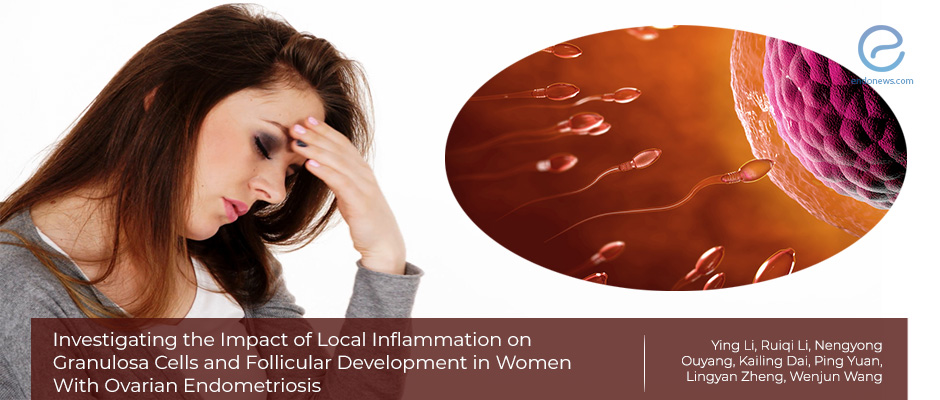Local inflammation and follicle development in women with ovarian endometriosis
Jul 6, 2020
The impact of inflammation on granulosa cells and follicular development
Key Points
Highlight:
- Dr. Wang group provides new insight into the role of the activated NF-kB pathways in granulosa cells and folliculogenesis in endometriosis patients.
Background:
- Granulosa cells (GC) play an important role in follicular development.
- In patients with endometriosis, abnormalities in GCs might impair oocyte maturation and lead to poor oocyte quality.
- Nuclear factor-kappa B (NF-kB) was the key point in inflammation.
- Activated by inflammatory cytokines, NF-kB was involved in cascade signal amplification of inflammation or cellular events.
Key points:
- A total of 184 women has participated. The ovarian endometriosis group consisted of patients with stage II and stage III endometriosis.
- The correlation analysis revealed that NF-kB expression was positively associated with the intrafollicular TNF-a levels in patients with endometriosis, which might negatively affect oocyte quality.
- The association between NF-kB Expression and mature oocytes was analyzed. For better analysis, several factors were considered.
- In patients with endometriosis, antral follicle count, and NF-kB expression of GCs were closely associated with the number of mature oocytes.
Conclusion:
- Endometriosis showed activated NF-kB pathways in GCs, which might negatively affect oocyte quality.
- Intrafollicular TNF-a might down-regulate hTERT via the NF-kB pathway, but further studies are required.
Lay Summary
Endometriosis, a cause of subfertility, is found in almost 50% of infertile women. The elevated levels of cytokines in the follicular fluid of patients with endometriosis might account for the ovulatory dysfunction.
Granulosa cells (GCs) play important roles in follicular development. In patients with endometriosis, abnormalities in GCs might impair oocyte maturation and lead to poor oocyte quality. Nuclear factor k B (NF-kB) was the key point in inflammation. Activated by inflammatory cytokines, NF-kB was involved in cascade signal amplification of inflammation or cellular events.
Here, Dr. Wang group from China aimed to explore the association between local inflammation and follicular development. Also, they tried to identify the mechanism involved in the impairment of follicular growth in patients with endometriosis and provide potential therapeutic targets for improvements of their ovarian function. This paper was recently published in the journal “Fertility and Sterility”.
For this study, a total of 184 women has participated. The ovarian endometriosis group consisted of patients with stage II and stage III endometriosis. Firstly, to understand the associations between intrafollicular cytokines and NF-kB p65 expression, the intrafollicular concentrations of cytokines measured. The correlation analysis revealed that NF-kB expression was positively associated with the intrafollicular TNF-a levels in patients with endometriosis. And this might negatively affect oocyte quality.
Next, the association between NF-kB p65 Expression and mature oocytes was analyzed. For the better analysis, several factors were considered such as NF-kB expression, the activity of GCs, antral follicle count, age, BMI, basal follicle-stimulating hormone, and estradiol levels, and total gonadotropin dosage. Interestingly, in patients with endometriosis, antral follicle count and NF-kB of GCs were closely associated with the number of mature oocytes.
"Endometriosis showed activated NF-kB pathways in GCs, which might negatively affect telomerase activity and oocyte quality. Intrafollicular TNF-a might down-regulate hTERT via the NF-kB pathway, but further studies are required", the authors concluded.
Research Source: https://www.ncbi.nlm.nih.gov/pubmed/31551156
Endometriosis hTERT inflammatory cytokines NF-k B telomerase activity

